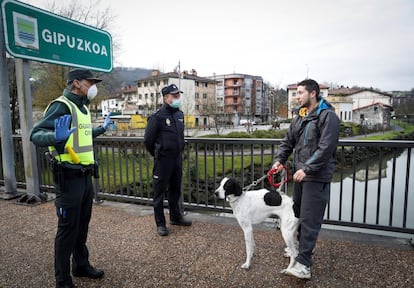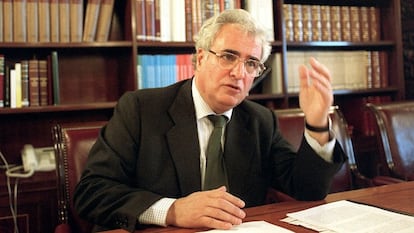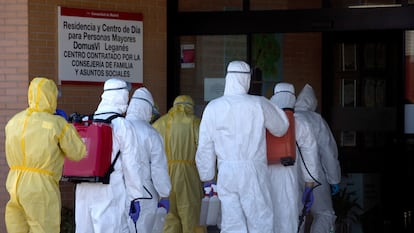New drop in overnight coronavirus deaths shows downward trend in Spain
Authorities reported 510 fatalities on Saturday, the lowest figure on record since March 23

Spain’s daily death toll from the coronavirus stood at 510 on Saturday morning, according to figures released by the Health Ministry.
This is the lowest number of overnight deaths since March 23, when there were 462 fatalities, and it appears to confirm a downward trend following the April 2 peak of 950 reported fatalities.
A total of 16,353 people have died from Covid-19 in Spain since the beginning of the pandemic, and there have been 161,852 confirmed cases. Spanish health officials also reported that nearly 60,000 people have recovered and have been discharged from hospital.
It is widely believed that the real figures are higher, as only people who have been tested for the coronavirus are being included in the official tally. This leaves out individuals with symptoms who die in their homes or at senior residences without ever getting tested.
Interior Minister Fernando Grande-Marlaska said on Saturday afternoon that the government will hand out 10 million face masks to users of public transit systems starting on Monday, but that using them will not be mandatory. The protective gear will be provided at transportation hubs across the country.
After ramping up confinement measures to include all non-essential workers two weeks ago, the government is now letting people with jobs in industry, construction and certain other sectors go back to their workplaces.
Enrique Múgica

Enrique Múgica, a historical figure of modern Spanish politics, is one of the latest victims of the coronavirus. He died on Friday at the age of 88.
A native of the Basque city of San Sebastián, he served as justice minister under the administration of Felipe González between 1988 and 1991, helped modernize the Socialist Party (PSOE), and held the position of Ombudsman between 2000 and 2010.
He was also a leading critic of the brand of nationalism defended by the now-defunct terrorist group ETA, which murdered his brother Fernando in 1996.
“A leading light of socialism, a man who devoted his entire life to the defense of democracy and freedom. He leaves us great sadness, but also the most valuable legacy: a better country. Farewell. Goian bego [rest in peace in the Basque language]” tweeted Prime Minister Pedro Sánchez.
Border controls
The Spanish government has approved a 14-day extension to the ongoing controls at its land borders with France and Portugal. The border checks, which were introduced on March 17 as part of Spain’s coronavirus containment efforts, will remain in place until April 25, and could be extended further if required.
Under the measures, only Spanish citizens, residents of Spain, cross-border workers and individuals who can prove force majeure causes, as well as diplomatic personnel, are being allowed into Spanish territory. Restrictions do not apply to transportation of goods in order to guarantee the supply chain.
The government noted that these measures are “in addition to the restrictions to access through ports and airports, which went into effect on March 23 and remain in place.”
Nursing homes and hospitals

Senior homes and hospitals have become the main clusters of coronavirus transmission in Spain. This will pose “the greatest challenge to virus containment once the confinement measures are eased,” said Pere Godoy, president of the Spanish Epidemiology Society (SEE).
“New contagions are happening in places where it is hard to observe the social distancing measures that are observed by the rest of society,” said a high-ranking health official at a regional government who spoke on condition of anonymity.
“Hospitals are a good example, but things are even more complicated at socio-sanitary centers due to the specific needs of residents and to the dynamics of caregiving,” this source added. “This affects people in senior homes most especially, but also other institutionalized groups with some kind of disability.”
Improvising
The Catalan chief of interior affairs, Miquel Buch, said on Saturday that the central government’s decisions with regard to the health crisis posed by the coronavirus pandemic are “the result of improvisation.” This, he added, is creating a feeling of uncertainty and stress among citizens.
Speaking on the radio station Catalunya Ràdio, Buch said that the Catalan executive is waiting to see what the central government’s strategy will be following the latter’s announcement that non-essential workers can go back to work on Monday, the news agency Europa Press reported.
English version by Susana Urra.
Tu suscripción se está usando en otro dispositivo
¿Quieres añadir otro usuario a tu suscripción?
Si continúas leyendo en este dispositivo, no se podrá leer en el otro.
FlechaTu suscripción se está usando en otro dispositivo y solo puedes acceder a EL PAÍS desde un dispositivo a la vez.
Si quieres compartir tu cuenta, cambia tu suscripción a la modalidad Premium, así podrás añadir otro usuario. Cada uno accederá con su propia cuenta de email, lo que os permitirá personalizar vuestra experiencia en EL PAÍS.
¿Tienes una suscripción de empresa? Accede aquí para contratar más cuentas.
En el caso de no saber quién está usando tu cuenta, te recomendamos cambiar tu contraseña aquí.
Si decides continuar compartiendo tu cuenta, este mensaje se mostrará en tu dispositivo y en el de la otra persona que está usando tu cuenta de forma indefinida, afectando a tu experiencia de lectura. Puedes consultar aquí los términos y condiciones de la suscripción digital.









































